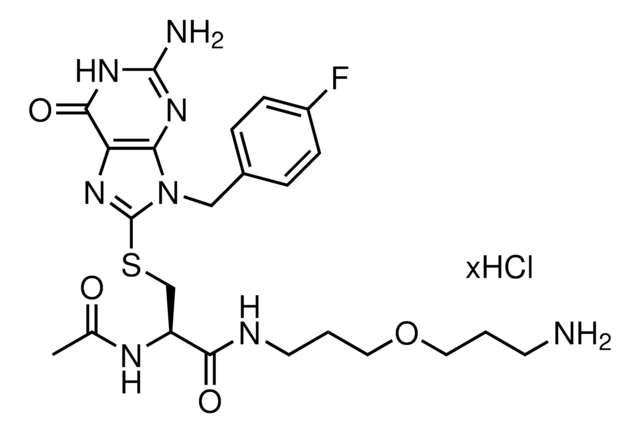Fontos dokumentumok
929301
FBnG-C3-PEG3-C3-NH2 hydrochloride
≥95%
Szinonimák:
(R)-2-Acetamido-3-((2-amino-9-(4-fluorobenzyl)-6-oxo-6,9-dihydro-1H-purin-8-yl)thio)-N-(3-(2-(2-(3-aminopropoxy)ethoxy)ethoxy)propyl)propanamide hydrochloride
About This Item
Javasolt termékek
Minőségi szint
Teszt
≥95%
Forma
powder
funkcionális csoport
amine
tárolási hőmérséklet
2-8°C
SMILES string
O=C1NC(N)=NC2=C1N=C(SC[C@@H](C(NCCCOCCOCCOCCCN)=O)NC(C)=O)N2CC3=CC=C(C=C3)F.Cl
Alkalmazás
Technology Spotlight: Degrader Building Blocks for Targeted Protein
Protein Degrader Building Blocks
Egyéb megjegyzések
Jogi információk
Tárolási osztály kódja
11 - Combustible Solids
WGK
WGK 3
Lobbanási pont (F)
Not applicable
Lobbanási pont (C)
Not applicable
Válasszon a legfrissebb verziók közül:
Analitikai tanúsítványok (COA)
Nem találja a megfelelő verziót?
Ha egy adott verzióra van szüksége, a tétel- vagy cikkszám alapján rákereshet egy adott tanúsítványra.
Már rendelkezik ezzel a termékkel?
Az Ön által nemrégiben megvásárolt termékekre vonatkozó dokumentumokat a Dokumentumtárban találja.
Tudóscsoportunk valamennyi kutatási területen rendelkezik tapasztalattal, beleértve az élettudományt, az anyagtudományt, a kémiai szintézist, a kromatográfiát, az analitikát és még sok más területet.
Lépjen kapcsolatba a szaktanácsadással








